-
 Bitcoin
Bitcoin $106,754.6083
1.33% -
 Ethereum
Ethereum $2,625.8249
3.80% -
 Tether USDt
Tether USDt $1.0001
-0.03% -
 XRP
XRP $2.1891
1.67% -
 BNB
BNB $654.5220
0.66% -
 Solana
Solana $156.9428
7.28% -
 USDC
USDC $0.9998
0.00% -
 Dogecoin
Dogecoin $0.1780
1.14% -
 TRON
TRON $0.2706
-0.16% -
 Cardano
Cardano $0.6470
2.77% -
 Hyperliquid
Hyperliquid $44.6467
10.24% -
 Sui
Sui $3.1128
3.86% -
 Bitcoin Cash
Bitcoin Cash $455.7646
3.00% -
 Chainlink
Chainlink $13.6858
4.08% -
 UNUS SED LEO
UNUS SED LEO $9.2682
0.21% -
 Avalanche
Avalanche $19.7433
3.79% -
 Stellar
Stellar $0.2616
1.64% -
 Toncoin
Toncoin $3.0222
2.19% -
 Shiba Inu
Shiba Inu $0.0...01220
1.49% -
 Hedera
Hedera $0.1580
2.75% -
 Litecoin
Litecoin $87.4964
2.29% -
 Polkadot
Polkadot $3.8958
3.05% -
 Ethena USDe
Ethena USDe $1.0000
-0.04% -
 Monero
Monero $317.2263
0.26% -
 Bitget Token
Bitget Token $4.5985
1.68% -
 Dai
Dai $0.9999
0.00% -
 Pepe
Pepe $0.0...01140
2.44% -
 Uniswap
Uniswap $7.6065
5.29% -
 Pi
Pi $0.6042
-2.00% -
 Aave
Aave $289.6343
6.02%
How to optimize backup strategies by combining cloud storage with local storage?
Combining local and cloud storage, with strong encryption, creates a robust cryptocurrency backup strategy. Regular testing and choosing a reputable cloud provider are crucial for optimal security and accessibility.
Mar 11, 2025 at 12:55 pm
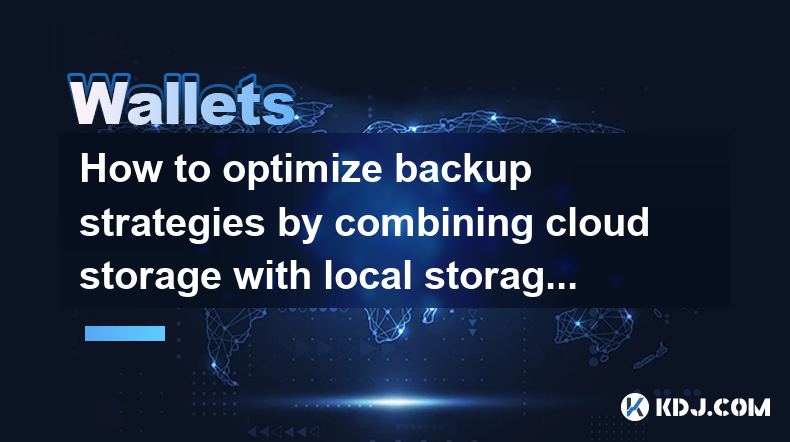
Key Points:
- Combining cloud and local storage offers enhanced security and accessibility for cryptocurrency backups.
- Local storage provides immediate access but is vulnerable to physical damage and theft.
- Cloud storage offers redundancy and accessibility but introduces security risks if not properly secured.
- Encryption is crucial for both local and cloud storage to protect private keys.
- Regular testing of your backup restoration process is essential.
- Choosing the right cloud provider and understanding their security features is vital.
How to Optimize Backup Strategies by Combining Cloud Storage with Local Storage
Securing your cryptocurrency holdings requires a robust backup strategy. Relying solely on a single method, whether it's local storage or cloud storage, is risky. A hybrid approach, combining both, offers the best protection. This article explores how to optimize your backup strategy by integrating these two methods.
The Importance of Local Storage:
Local storage, such as a hard drive or USB drive, provides immediate access to your cryptocurrency backups. This is crucial in situations where you need to quickly recover your assets. However, local storage is vulnerable. Physical damage, theft, or even a simple malfunction can lead to irretrievable loss of your keys. To mitigate this risk, use multiple physical locations for your backups and consider using hardware wallets for additional security. Never store your seed phrase digitally on your local machine.
The Benefits of Cloud Storage:
Cloud storage offers redundancy and accessibility. Reputable providers utilize multiple data centers, ensuring your backups are protected against regional outages or disasters. You can access your backups from anywhere with an internet connection. However, cloud storage isn't without risks. Data breaches, though rare with reputable providers, are a possibility. Furthermore, you're relying on a third party to secure your data, which introduces a degree of trust.
Combining Local and Cloud Storage: A Robust Solution:
The ideal solution involves combining both local and cloud storage. This approach leverages the strengths of each method while mitigating their weaknesses. Here's a step-by-step guide:
- Encrypt your backups: Before storing your backups, encrypt them using strong encryption software. This protects your data even if your local storage or cloud storage is compromised. Use a password manager to securely store your encryption keys.
- Store multiple copies locally: Create at least two copies of your encrypted backups and store them in separate physical locations. Consider using different storage media (e.g., a hard drive and a USB drive).
- Choose a reputable cloud provider: Research and select a cloud provider with a strong security reputation and robust data protection measures. Look for providers offering features like two-factor authentication and encryption at rest.
- Upload encrypted backups to the cloud: Upload your encrypted backups to your chosen cloud provider. This adds an extra layer of redundancy and protection against local disasters.
- Regularly test your backups: Periodically test your backup restoration process to ensure everything is working correctly. This involves attempting to restore your backups to a new device or system.
Choosing the Right Cloud Provider:
Selecting the appropriate cloud provider is vital. Consider these factors:
- Security features: Look for providers offering encryption, two-factor authentication, and robust security protocols.
- Reputation: Choose a provider with a proven track record of security and reliability.
- Data location: Consider where your data is stored and whether it complies with local regulations.
- Pricing: Compare pricing plans and features to find a provider that fits your budget and needs.
Encryption Best Practices:
Encryption is paramount. Use strong, unique passwords for your encryption keys, and avoid reusing passwords across multiple accounts. Consider using a hardware security module (HSM) for ultimate security, especially for high-value cryptocurrency holdings.
Hardware Wallet Integration:
Many hardware wallets offer backup options. These often involve a seed phrase or recovery key. Remember to securely back up this information using the methods described above. Never store your seed phrase digitally without strong encryption.
FAQ:
Q: What is the best cloud storage for cryptocurrency backups?
A: There's no single "best" provider. Reputable options include providers like AWS, Google Cloud, and Microsoft Azure, but thorough research based on your specific security needs and budget is essential.
Q: How often should I back up my cryptocurrency?
A: The frequency depends on the volume of transactions and the volatility of your holdings. Daily or weekly backups are recommended for active traders, while less frequent backups might suffice for long-term holders.
Q: What if I lose my encrypted backups?
A: If you lose your encrypted backups and haven't followed the multiple backup strategy, recovery will be difficult or impossible. This underscores the importance of redundancy.
Q: Are cloud backups completely secure?
A: No, cloud backups are not completely secure. While reputable providers employ robust security measures, there's always a degree of risk associated with relying on a third-party service. Encryption and multiple backups mitigate this risk.
Q: Can I use free cloud storage for cryptocurrency backups?
A: While possible, free cloud storage options often have limited storage space and may lack the advanced security features of paid plans. For crucial backups, a paid, reputable provider is recommended.
Disclaimer:info@kdj.com
The information provided is not trading advice. kdj.com does not assume any responsibility for any investments made based on the information provided in this article. Cryptocurrencies are highly volatile and it is highly recommended that you invest with caution after thorough research!
If you believe that the content used on this website infringes your copyright, please contact us immediately (info@kdj.com) and we will delete it promptly.
- 2025-W Uncirculated American Gold Eagle and Dr. Vera Rubin Quarter Mark New Products
- 2025-06-13 06:25:13
- Ruvi AI (RVU) Leverages Blockchain and Artificial Intelligence to Disrupt Marketing, Entertainment, and Finance
- 2025-06-13 07:05:12
- H100 Group AB Raises 101 Million SEK (Approximately $10.6 Million) to Bolster Bitcoin Reserves
- 2025-06-13 06:25:13
- Galaxy Digital CEO Mike Novogratz Says Bitcoin Will Replace Gold and Go to $1,000,000
- 2025-06-13 06:45:13
- Trust Wallet Token (TWT) Price Drops 5.7% as RWA Integration Plans Ignite Excitement
- 2025-06-13 06:45:13
- Ethereum (ETH) Is in the Second Phase of a Three-Stage Market Cycle
- 2025-06-13 07:25:13
Related knowledge
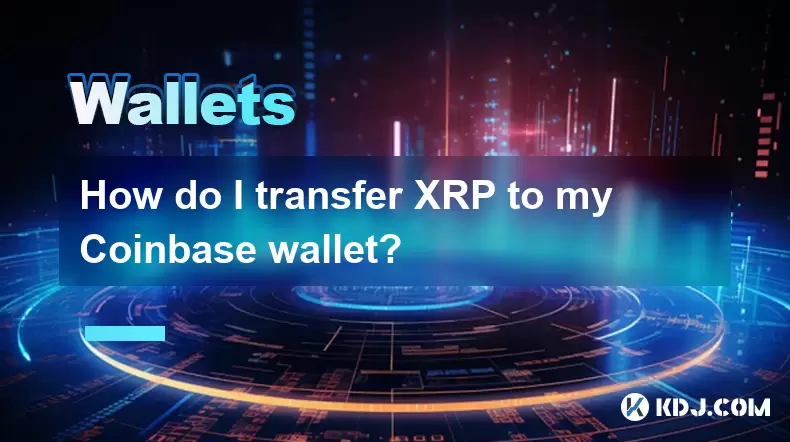
How do I transfer XRP to my Coinbase wallet?
Jun 16,2025 at 04:57pm
Understanding the Basics of XRP and Coinbase CompatibilityBefore initiating any transfer, it’s essential to confirm whether Coinbase supports XRP. As of recent updates, Coinbase has resumed offering XRP trading services on its platform after a period of uncertainty due to legal issues involving Ripple Labs. However, availability may vary depending on yo...

How do I deposit BNB into my Trust Wallet?
Jun 15,2025 at 03:56pm
Understanding BNB and Trust Wallet CompatibilityBefore initiating a deposit, it’s crucial to understand what BNB is and how it interacts with Trust Wallet. BNB (Binance Coin) is a utility token created by the Binance exchange. It can be used for paying transaction fees, participating in token sales, and more. Trust Wallet, on the other hand, is a mobile...
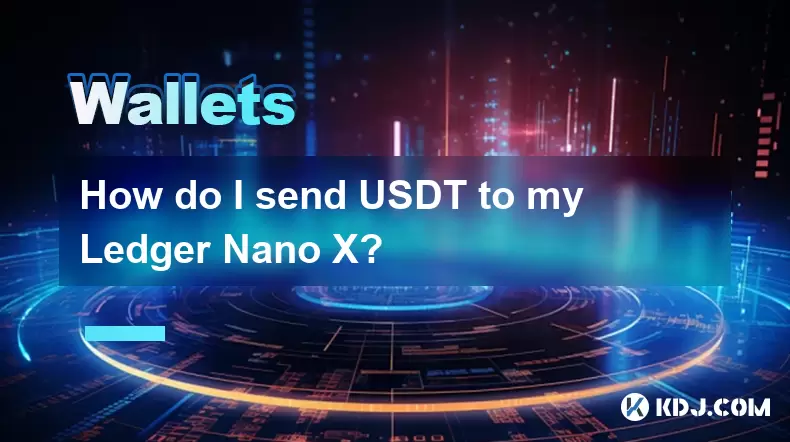
How do I send USDT to my Ledger Nano X?
Jun 15,2025 at 06:28am
What is USDT and Why Use Ledger Nano X?USDT, also known as Tether, is one of the most widely used stablecoins in the cryptocurrency ecosystem. It operates on various blockchain networks such as Ethereum (ERC-20), Tron (TRC-20), and others, offering users a digital asset pegged 1:1 to the US dollar. When it comes to storing USDT securely, hardware wallet...
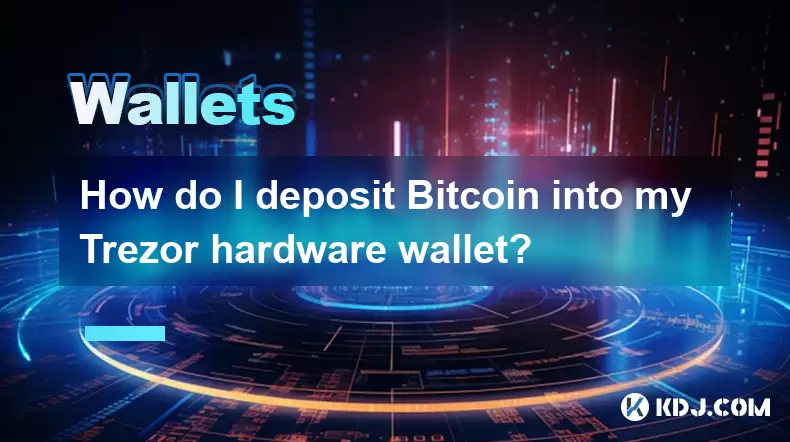
How do I deposit Bitcoin into my Trezor hardware wallet?
Jun 14,2025 at 12:29pm
What is a Trezor Hardware Wallet?A Trezor hardware wallet is a secure device designed to store cryptocurrencies offline, protecting them from online threats. Unlike software wallets, which are vulnerable to hacking and malware, Trezor stores private keys on the physical device itself. This ensures that transactions can only be approved by physically int...
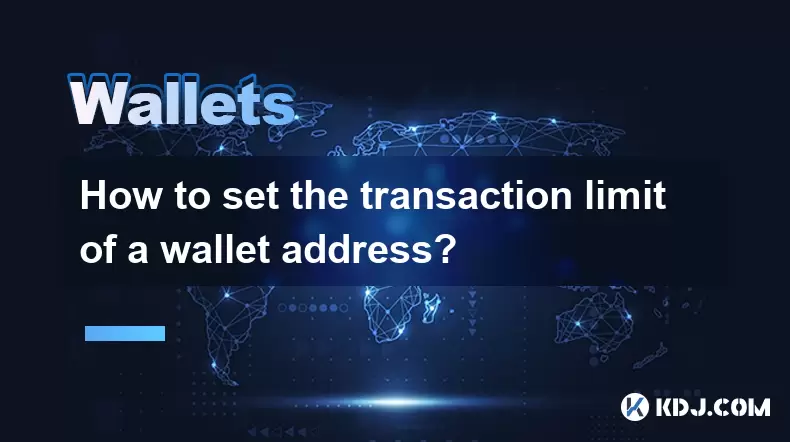
How to set the transaction limit of a wallet address?
Jun 16,2025 at 04:08am
Understanding the Concept of Transaction Limits in Cryptocurrency WalletsIn the cryptocurrency ecosystem, transaction limits refer to predefined restrictions placed on the amount of digital assets that can be sent or received by a wallet address within a specified timeframe. These limits are typically enforced by platforms such as exchanges, custodial w...
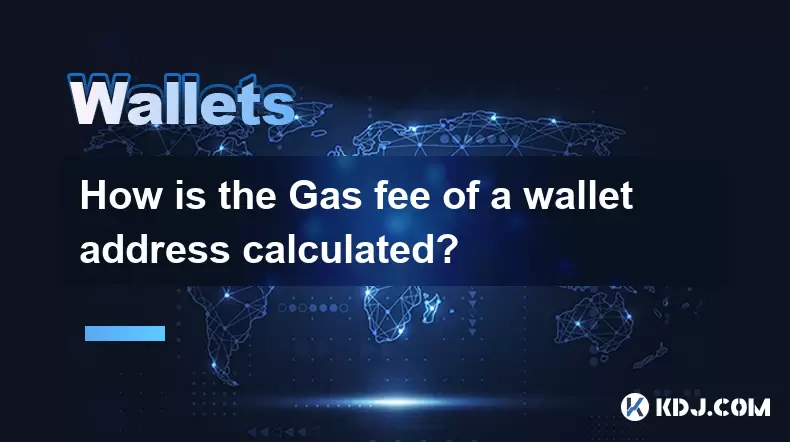
How is the Gas fee of a wallet address calculated?
Jun 14,2025 at 07:57pm
Understanding the Basics of Gas Fees in Blockchain TransactionsIn the cryptocurrency ecosystem, particularly within Ethereum-based networks, a Gas fee is an essential component of executing transactions or smart contract operations. The Gas fee serves as compensation for miners or validators who process and confirm transactions on the blockchain. It is ...

How do I transfer XRP to my Coinbase wallet?
Jun 16,2025 at 04:57pm
Understanding the Basics of XRP and Coinbase CompatibilityBefore initiating any transfer, it’s essential to confirm whether Coinbase supports XRP. As of recent updates, Coinbase has resumed offering XRP trading services on its platform after a period of uncertainty due to legal issues involving Ripple Labs. However, availability may vary depending on yo...

How do I deposit BNB into my Trust Wallet?
Jun 15,2025 at 03:56pm
Understanding BNB and Trust Wallet CompatibilityBefore initiating a deposit, it’s crucial to understand what BNB is and how it interacts with Trust Wallet. BNB (Binance Coin) is a utility token created by the Binance exchange. It can be used for paying transaction fees, participating in token sales, and more. Trust Wallet, on the other hand, is a mobile...

How do I send USDT to my Ledger Nano X?
Jun 15,2025 at 06:28am
What is USDT and Why Use Ledger Nano X?USDT, also known as Tether, is one of the most widely used stablecoins in the cryptocurrency ecosystem. It operates on various blockchain networks such as Ethereum (ERC-20), Tron (TRC-20), and others, offering users a digital asset pegged 1:1 to the US dollar. When it comes to storing USDT securely, hardware wallet...

How do I deposit Bitcoin into my Trezor hardware wallet?
Jun 14,2025 at 12:29pm
What is a Trezor Hardware Wallet?A Trezor hardware wallet is a secure device designed to store cryptocurrencies offline, protecting them from online threats. Unlike software wallets, which are vulnerable to hacking and malware, Trezor stores private keys on the physical device itself. This ensures that transactions can only be approved by physically int...

How to set the transaction limit of a wallet address?
Jun 16,2025 at 04:08am
Understanding the Concept of Transaction Limits in Cryptocurrency WalletsIn the cryptocurrency ecosystem, transaction limits refer to predefined restrictions placed on the amount of digital assets that can be sent or received by a wallet address within a specified timeframe. These limits are typically enforced by platforms such as exchanges, custodial w...

How is the Gas fee of a wallet address calculated?
Jun 14,2025 at 07:57pm
Understanding the Basics of Gas Fees in Blockchain TransactionsIn the cryptocurrency ecosystem, particularly within Ethereum-based networks, a Gas fee is an essential component of executing transactions or smart contract operations. The Gas fee serves as compensation for miners or validators who process and confirm transactions on the blockchain. It is ...
See all articles

























































































